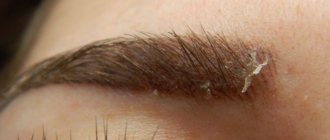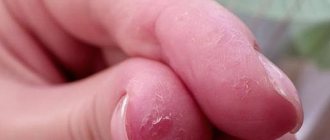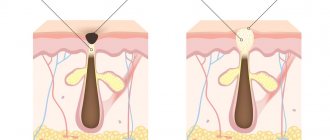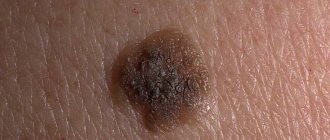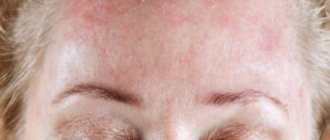Excessive fluid retention in the intercellular spaces of tissues (interstitial space) is called edema. Externally, edema is manifested by swelling, an increase in volume, and swelling of the swelling area. Edema is especially pronounced in the lower half of the body. The reasons are associated with congestion in the systemic circulation. Organs and tissues that are not sufficiently penetrated by connective tissue fibers, for example, the face, may swell unevenly. Swelling of the right side of the face occurs more often. The reasons for this phenomenon may be hidden behind various conditions and diseases.
An objective examination reveals changes in the turgor (elasticity) of the skin. In order to understand whether a particular area of the body is swelling, you need to apply pressure with your finger and observe. In edematous tissues, the pressure mark does not straighten out quickly, the surrounding skin has a pale color.
What causes swelling on the face
If the eyes and face are swollen, the reasons can be both pathological and physiological. Pathological causes are diseases of the internal organs or organs of vision, which are accompanied by disturbances in the outflow of fluid and its retention in the body. Most often they are:
- Kidney dysfunction.
- Arterial hypertension.
- Liver failure.
- Diseases of the heart and blood vessels.
- Pathologies of the thyroid gland and the endocrine system as a whole.
- Metabolic disorders - vitamin deficiency or hypervitaminosis.
Acute renal failure, arterial hypertension, hypothyroidism - all these pathologies not directly related to the eyes are accompanied by severe swelling of the face and eyelids
But sometimes the face can swell even in a healthy person, in this case they talk about physiological swelling under or above the eye and on the face. Why they may occur:
- A strict diet with severe dietary restrictions, fasting for various reasons.
- Chronic lack of sleep.
- Stress, tears, nervous tension.
- Eye fatigue due to excessive strain.
- Incorrectly selected decorative cosmetics or care products.
Some women experience severe swelling of the face before the onset of menstruation. In children, swelling is often accompanied by colds caused by viruses or bacterial infections. To determine the exact cause of swelling on the face, it is best to go to see a doctor or invite a specialist to your home. If for some reason this is not possible, you need to pay attention to other symptoms that accompany swelling and puffiness of the face and organs of vision.
Causes of edema
The soft tissues of the human face contain few fibers of connective tissue partitions. Therefore, swelling that appears locally, for example, under the eye or near the ear, can spread to a fairly large area. The entire adjacent side of the face, the right or left half of the neck swells.
This is especially noticeable under the eye, since the orbital part of the eye sockets is covered only by soft tissue with virtually no muscle underneath. That is why, when struck or injured in the area of the bridge of the nose, victims experience a “symptom of glasses” - bruising and swelling of both eyes.
So, why might the right side of the face swell? It is necessary to understand the reasons; only in this case will it be possible to provide qualified assistance and help get rid of the disease.
We should briefly dwell on such points as:
- excessive fluid intake on the eve of bedtime;
- abuse of alcohol, salty or fried foods;
- insufficient content of vitamins and fiber in the diet;
- overeating in the evening;
- chronic lack of sleep, insomnia.
All of the above conditions are characterized by swelling of the face, but, as a rule, it is uniform. It is expressed by general puffiness, pallor of the skin, and more swelling under the eyes. Asymmetry of fluid accumulation in soft tissues is rare in these conditions.
Typically, the cause of swelling on one side or another of the face lies in the presence of some concomitant pathology or condition of the body. They are divided into two large groups: general and local.
Other symptoms and signs of facial swelling
By the accompanying symptoms, you can determine which diseases caused the edema. Let's look at the most common signs and phenomena that may indicate the development of which pathologies and disorders:
How to remove swelling on eyelids
- Dense, painless swelling on the face and around the eyes, forming in the late afternoon, bluish skin, shortness of breath are possible signs of heart disease. In this case, you should contact a cardiologist.
- If your eyes are swollen after a night's sleep, the problem may be improper kidney function or chronic alcohol abuse. The swelling is soft, watery, mobile, and the skin on the face acquires a yellow tint. To remove such swelling, you will need to adjust your lifestyle and drinking regime, and in case of kidney failure, undergo appropriate treatment from a nephrologist.
- High blood pressure provokes the accumulation of fluid not only on the face, but also on the limbs. Swelling with high blood pressure can be relieved only with the help of special drugs that dilate blood vessels, accelerate blood circulation and have a diuretic effect. It is also recommended to limit fluid intake.
- With allergic edema, the following phenomena are observed: redness of the skin, itching, burning, rashes and peeling. Shortness of breath often develops, lacrimation, runny nose and cough appear. The causes may be certain medications and food products, cosmetics, chemical fumes, even low-quality water, for example, with chlorine. In severe cases of allergies, the patient begins to choke, may lose consciousness and fall into a coma. The wisest thing to do would be to call a doctor as soon as possible if allergy symptoms are rapidly increasing.
- With vascular pathologies, in addition to swelling, a red capillary network is often noticeable in the eyes and on the skin of the face, bruises form under the eyes, and the head may become very dizzy and hurt.
- If the eyes are red, swollen, watery, purulent discharge appears, visual acuity is impaired, most likely we are talking about ophthalmological diseases caused by infection. An ophthalmologist will tell you what to do and how to treat swelling along with other unpleasant symptoms after examining you and determining the type of infection.
- Infectious diseases of the oral cavity and upper respiratory tract, among other pathologies, can cause swelling of the eyes and face. Caries, tonsillitis, pharyngitis, sinusitis are often accompanied by edema and swelling around the eyes, on the bridge of the nose, temples, and in the area of the cervical lymph nodes. Treatment in this case requires complex treatment.
Abscess of the orbit, phlegmon, inflammation of the facial nerves, myxedema - all these pathologies also manifest themselves as severe, painful swelling of the face, which cannot be eliminated with improvised means and diuretics.
Important: Myxedema is a rather rare but dangerous disease characterized by the accumulation of mucous deposits in the subcutaneous tissue. Myxedema develops against the background of hormonal disorders and is a pathology of the endocrine system. In fact, this is a complication of hypothyroidism, when the thyroid gland cannot cope with its functions and does not produce enough hormones. The patient's face can change its shape beyond recognition, acquiring the so-called moon-shaped outline. Treatment of myxedema will take a long time, using hormones, immunomodulators, and drugs that normalize metabolic processes in the body.
General factors
Edema occurs when a large amount of fluid accumulates in the skin and the tissue becomes swollen. Such swelling may be mild, localized only in a small area - under the eyes or on the eyelids, or may cover the entire face.
If there are no health problems, most likely one of the following factors led to the swelling:
- Dietary disorder. This includes overeating before bed and consuming large amounts of salt, which accumulates in tissues and retains water in the intercellular space. In addition, salt negatively affects kidney function and blood pressure, so it is not recommended to consume it in quantities of more than 2 g per day.
- Violation of the drinking regime. Edema is caused not only by excess fluid, but also by its lack. It is important to maintain the water-salt balance in the body - to do this you need to drink at least 30 ml of water per kg of body weight. For example, a person weighing 70 kg should drink 2 liters of 100 milliliters of water per day.
- Abuse of alcoholic beverages the day before. Alcohol leads to dehydration and the removal of salts, which causes fluid to leave the blood into the intercellular space.
- Stress and lack of sleep. Lack of emotional and physical rest leads to an excess of steroid hormones in the body, which affect the kidneys and impair water excretion.
- Incorrect sleeping position. If the head rests too low or rests on an uncomfortable pillow, water can accumulate in the tissues of the face, unable to be drained away by gravity.
- Hormonal imbalance caused by the premenstrual period.
- Eye irritation caused by prolonged computer use or heavy crying.
- Excessive use of cosmetics, especially creams.
- Smoking.
- Age-related changes in the epidermis.
In such cases, swelling is a temporary phenomenon; Normalizing your lifestyle, monitoring the water-salt balance, using compresses and masks that improve the condition of your facial skin, and enriching your diet with vitamins and microelements will help prevent their occurrence.
How to deal with swelling
The choice of an effective decongestant depends on the cause of the swelling. Both pharmaceutical preparations and traditional medicine recipes are used, and various physiotherapy procedures will be a good addition. But you shouldn’t try all the suggested remedies on yourself at once. The desired effect is achieved only with consistent, coordinated actions. The basic rules of treatment are as follows:
- For pathologies of the kidneys, liver, and blood vessels, undergo the necessary examination and begin comprehensive treatment of the underlying disease. As the functions of the internal organs are restored, the swelling will also go away. Diet therapy and physical activity that stimulates the outflow of blood and lymph will be a good help.
- Diseases of the endocrine system require more complex and lengthy treatment. Restoring hormonal levels is not so easy, especially in older people. Various herbal remedies will help here, which can be used for a long time without significant side effects. In diabetes mellitus, following a diet is extremely important.
- Treatment of allergic edema, as mentioned above, is based primarily on identifying the irritant allergen. Any antihistamines alleviate the patient's condition only temporarily, but do not provide a lasting therapeutic effect. Therefore, a patient prone to allergic reactions should always have with him a sheet with a list of hazardous substances, and it is also necessary to make a corresponding entry in the medical record.
- Pain and swelling due to eye inflammation or upper respiratory tract infections are also eliminated through complex treatment. Antibacterial and anti-inflammatory drugs of systemic action and agents for local use are used: various solutions and liquids for washing, rinsing, compresses and lotions.
Pharmacies offer a wide range of different diuretics. Some of them have a rather aggressive effect on the body and have a long list of contraindications and side effects. Therefore, you can resort to medication to solve the problem only after examination by a doctor.
For severe swelling, your doctor may prescribe one of the following medications:
- Furosemide.
- Triflas.
- Veroshpiron.
- Torsemide.
Pharmaceutical drugs with a diuretic effect are enough to be taken once a day to reduce the volume of fluid in the body, but they also have a number of serious side effects
Puffiness under the eyes in the morning - causes and treatment, how to remove it
The reasons have already been discussed above. To these, perhaps, we should add the allergic nature of edema, as well as significant problems with the spine.
Treatment of edema involves:
Cosmetology procedures: daily hygienic facial procedures, cryolifting, mesotherapy.
Use of special creams: with caffeine, green coffee, roller gel around the eyes.
Creams with horse chestnut, based on collagen substances, elastane, hyaluronic acid, and so on, as well as other, no less useful, components.
Preparations with vitamin K and natural whitening pigments.
What traditional medicine advises
The simplest, most accessible and safe diuretic is fresh vegetable or fruit juices. Experienced people recommend combining a quarter glass of freshly squeezed juices of carrots, cucumbers, celery and lemon. Stir the resulting mixture, add 50 ml of warm water and drink on an empty stomach. If you do this procedure every day for three weeks, you can get rid of not only swelling on the face, but also cleanse the intestines and skin of waste and toxins, and lose up to 3 kg of excess weight.
Herbal medicine is an affordable and gentle way to combat swelling on the face and fluid retention in the body
The following recipes will also help in the fight against edema:
- Mint infusion. Chop fresh or dry mint. You will need two handfuls of fresh, two tablespoons of dried. Place the mint in a thermos and pour 500 ml of boiling water, close and leave for one hour. Drink the strained infusion warm in small sips throughout the day. This remedy is suitable for combating edema in children and pregnant women.
- Flax seeds. A tablespoon of seeds is poured into a bowl, poured with a liter of water, placed on the fire, brought to a boil and cooked for a quarter of an hour. Then cover and let it brew for an hour. The infusion is drained and taken warm in small portions throughout the day. The seeds can be wrapped in gauze and applied to the swelling for a quarter of an hour as a compress. The course of treatment lasts two weeks or until swelling is completely eliminated, if it has not gone away after 14 days.
- Bearberry. Two tablespoons of bearberry are poured into 500 ml of hot water, covered and left for half an hour. Then the mixture is stirred and filtered. The infusion is taken three times a day, a third of a glass, the course of treatment lasts 14–21 days.
Important: although folk remedies are considered gentle and harmless, you should not violate the recipe and dosage. Infusions based on medicinal herbs can also cause severe allergic reactions, eating disorders and poisoning. If swelling increases, a rash appears, shortness of breath, vomiting, or diarrhea, you should immediately rinse your stomach, take activated charcoal and seek medical help.
Darsonvalization, biorevitalization, various types of massages - this is what modern cosmetology offers for its part to combat facial swelling
If your face swells in the morning - what to do, folk remedies
Special lotions made from a soda solution (1/4 teaspoon of baking soda per 100 milliliters of cooled boiled water) have an excellent effect. You need to soak a cotton pad with this solution, keeping it in places where swelling has formed for about 15 minutes.
Also, it’s a good idea for edema to get rid of regular black bread. A piece of bread must be cooled well in the refrigerator, and then applied to closed eyelids for a few minutes.
A good, albeit very simple and uncomplicated recipe, simple clean boiled water, pre-cooled in the refrigerator, with which to wash your face.
Infusions and natural decoctions
Rose hip.
It copes excellently with swelling of the soft tissues of the face of various etiologies. The berries of this shrub are used to prepare a medicinal product.
The decoction can be used not only for medicinal, but also for preventive purposes. To prepare the decoction, you should take 3 glasses of clean drinking water (in total - 700-750 milliliters), 3-5 rose hips (depending on their size) for each glass (that is, in total it will be from 8-9 - to 14- 15 berries).
Place the fruits in an enamel bowl, fill with pre-prepared drinking water, put on a low heat on a gas stove (you can also use an electric stove), bring to a boil and boil without changing the heating intensity for 13-14 minutes.
Cosmetic and spa treatments against facial swelling
If you need to quickly and radically eliminate physiological or age-related swelling under the eyes and on the face, you can always contact cosmetology salons and spa salons. Today, a number of effective procedures are offered using various equipment and cosmetics to combat any defects in appearance. What can a cosmetologist do in the absence of contraindications and the client’s solvency:
- Darsonvalization. Cleansed skin is treated with high-frequency currents. As a result, lymphatic drainage is activated, congestion is eliminated, tissues are saturated with oxygen, and look healthy and toned.
- Myolifting. It helps if facial puffiness is caused by sagging muscle tissue after injury, surgery, or due to age-related changes. The skin and muscles are exposed to dosed current discharges, which tones the tissues and improves their nutrition.
- Mesotherapy. This method consists of subcutaneously administering special solutions that stimulate metabolic processes and saturate tissues with oxygen and microelements. Immediately after the procedure, swelling may increase. This is a natural reaction of tissues to injections. But a few days after complete recovery, the contour of the face and eyes tightens, swelling goes away, the skin becomes firm, elastic, and has a beautiful, even color.
All procedures have contraindications and should only be performed by a qualified, experienced technician. After treatments at the spa, you should definitely follow all the specialist’s recommendations in order to minimize the likelihood of side effects and get the expected result.
Medicines and cosmetics
Often, to treat edema, they resort to the use of pharmaceutical drugs or cosmetics.
The former are prescribed, as a rule, to regulate the activity of internal organs, that is, with the aim of getting rid of the very cause of edema, and not its consequences. Specific drugs are used for specific indications.
For example, if the cause of edema is problems with the cardiovascular system, then drugs from this group are selected - cardiological, if the root cause is kidneys, then treatment is aimed at them and, accordingly, the necessary medications are selected
For the liver - your own medications and so on. Prescription of pharmaceutical drugs should be carried out by a qualified specialized physician. Cosmetic products, for the most part, are aimed at eliminating symptoms - the edema itself, but not its root cause. They were described above.
Methods to get rid of puffiness of the face and eyes
Nutrition
First of all, you should review your diet. Avoid eating fatty, salty, smoked foods, marinades, ketchups, sauces, sweets and baked goods.
Minimize your salt intake - it is recommended to consume no more than 2-3 g of this seasoning per day, or even better, at least for a while, give it up altogether. Include foods containing fiber in your menu - fresh vegetables, fruits, berries, cereals cooked in water.
Drink 1.5 to 2.5 liters of pure still water per day.
Eliminate alcohol, do not overeat or drink a lot of liquid at night, have dinner at least 2 hours before bedtime.
Healthy sleep
To get rid of or prevent the accumulation of excess fluid in the intercellular tissues, you need to get proper rest. Sleep at least 8 hours a day, use a comfortable, soft and high enough pillow. Try to go to bed as early as possible, no later than 10 pm.
Compresses and lotions
You can quickly eliminate facial swelling using topical products. For these purposes, you can use coffee ice. It’s easy to prepare: brew black coffee (without sugar, of course), pour into molds and freeze.
If necessary, wipe your face, cleansed of cosmetics and sebaceous secretions, with a piece of ice.
Potato juice also has a good effect. Generously moisten gauze folded in several layers with freshly squeezed potato juice and apply it to your face. After 10 minutes, remove the compress and wash with warm boiled water. You can also make an application from potatoes: to do this, simply cut the tuber into thin circles, place them on your face and leave for 7-10 minutes.
Daily washing with an infusion of medicinal herbs - chamomile, linden, mint, lingonberry leaves - will help eliminate puffiness and give the skin a blooming, healthy look. But do not forget that the broth must be freshly prepared; you should not prepare it for future use.
Why the face swells: getting rid of puffiness
Sometimes after sleep we see a swollen and tired face in the mirror, causing negative emotions and a desire to get rid of the swelling as quickly as possible , so as not to cause ridicule from colleagues at work and not to listen to inappropriate remarks about the fun spent the night before. To effectively solve the problem, you should establish the cause of the pathology, as well as perform certain manipulations, which we will discuss in this article.
What causes the defect to appear
Swelling on the face often occurs due to hormonal imbalances in the body.
The face may swell due to undetected diseases of the internal organs, so if you constantly experience swelling, you must undergo a full medical examination of the body!
The most common causes of a swollen face are:
- drinking a large amount of liquid before bedtime;
- excessive consumption of salt and salty foods;
- infections and inflammations of the nasopharynx, various colds;
- allergic reactions to plants, medications, as well as certain types of cosmetics;
- diseases and pathologies of the heart, kidneys, liver, blood vessels, endocrine, reproductive and urinary systems;
- blood supply disorders, which may be caused by a low pillow or incorrect body position during sleep;
- intoxication of the body (poisoning);
- metabolic disorders;
- chronic vitamin deficiencies;
- frequent stress and nervous exhaustion;
- the period of pregnancy, puberty and menopause, when the hormonal balance in the body is disrupted;
- dental diseases of teeth and gums;
- neuritis and neuralgia of the facial ternary nerve, accompanied by pain and the appearance of facial asymmetry;
- diseases of the epidermis in the form of dermatitis, folliculitis, furunculosis and others, characterized by the formation of rashes and swelling;
- pathologies of the central nervous system due to insufficient blood circulation in the areas where the tumor appears;
- osteochondrosis of the cervical spine, which is dangerous due to compression of the vessels of the head and neck, poor circulation in the face, which ultimately leads to its swelling;
- diabetes mellitus, which causes malfunctions in all organs and systems.
If your lips are swollen
When lip swelling is observed, doctors name the following reasons for this phenomenon:
- food, medicinal, and allergic reactions to cold;
- damage to the mucous membrane caused by a skin reaction to chemical food dyes and aggressive cosmetic additives;
- climatic conditions (cold or dry wind, low indoor humidity, frost);
- diseases of the digestive tract, autonomic nervous system, blood vessels and liver;
- inflammatory and infectious processes on the skin.
Rubbing the skin with ice cubes helps with excessive swelling of the face.
When one half of the face swells
The formation of partial swelling is associated with the following factors:
- receiving mechanical damage as a result of a blow, bruise, fall, resulting in damage to soft tissues;
- bites of various insects;
- local inflammatory processes in organs and tissues located next to the tumor, as well as purulent skin lesions;
- angioedema, which appears due to severe allergies, most often localized in the lower half of the face;
- pathology of the blood vessels located in this area of the skin;
- erythema accompanied by swelling of the upper part of the face.
The determination of an accurate diagnosis should be made by a doctor after receiving data from basic clinical tests and the necessary laboratory tests that will help prescribe the correct therapeutic treatment.
Swelling of the face after solarium
Severe swelling on the face that occurs after visiting a solarium may be associated with:
- individual skin reaction to ultraviolet rays;
- an allergic reaction to the constituent components of the sunscreens used, usually characterized by redness, itching, puffiness of the face, which can even cause total swelling of the internal organs;
- increased arterial and intracranial pressure as a result of receiving a strong dose of radiation and a sharp rush of blood to the brain, most often accompanied by dizziness, nausea and headache;
- receiving a regular burn, which causes swelling due to the accumulation of fluid in the affected tissues of the epidermis.
Swelling of the right and left sides of the face
A tumor that occurs only on the right side of the face is associated with the following disorders:
- periodontitis, gumboil, cyst or abscess caused by dental diseases;
- ischemic changes in some facial tissues associated with vascular pathologies and impaired blood supply;
- development of otitis media or conjunctivitis with ear pain and watery eyes;
- right-sided sinusitis or sinusitis with runny nose and sinus congestion;
- dermatological diseases of an inflammatory, infectious nature against the background of rashes and the appearance of painful bumps on the skin, spreading to healthy, nearby tissues;
- angioedema problems.
Swelling that appears on the left side of the face while the right side is in normal condition can be provoked by:
- thrombophlebitis, which disrupts normal blood circulation and lymph outflow when fluid accumulates in certain tissues;
- vascular ischemia, disrupting the trophism of skin tissue, as well as metabolic and metabolic processes;
- damage to the nerve endings of vasomotor fibers resulting from pathological changes in the central nervous system;
- paralysis associated with a decrease in lymphatic drainage function and disruption of systemic blood flow on the affected side of the face;
- inflammatory processes occurring in this part of the brain;
- individual allergic manifestations;
- inflammatory, infectious and fungal infections of the ear, nose and throat;
- purulent processes in the teeth and gums located in this part of the face.
Facial massage helps a lot against swelling
Methods for eliminating the defect
Of great importance for effectively solving the problem is the accuracy of identifying the cause that caused swelling of the face.
- If it is triggered by stress, lack of sleep, general overwork of the body, the answer is clear and simple - calm down, have a good rest, try to completely relax.
- If you use night care cosmetics, you must apply it no later than 3 hours before going to bed, otherwise the moisture and lipids contained in the composition will remain on the surface of the skin and cause swelling.
- Performing simple massage effects by lightly and gently tapping your fingertips in the direction of the massage lines can give excellent results by activating blood circulation, eliminating congestion, accelerating lymph outflow and improving metabolic processes.
- Rubbing the skin with ice cubes prepared from decoctions of chamomile, St. John's wort, string, linden, sage or mint has an excellent effect, quickly eliminating swelling by accelerating blood flow, training blood vessels, improving metabolism and metabolic processes.
- A short-term refusal of salt, especially if you have previously abused salty foods, provides quick relief from facial swelling.
- Eating diuretic herbs (corn silk, rose hips, bear's ears) can also get rid of a swollen face, and very quickly.
- The use of home mechanical and other types of massagers is recommended for any skin, especially those with swelling, as it promotes blood flow to the face, eliminates stagnation, and improves lymphatic drainage and metabolic functions.
- Homemade masks based on raw and boiled potatoes, cucumber, aloe, green tea, parsley, dill are great for getting rid of swelling, improving local tissue trophism and the general condition of the skin.
- Compositions such as heparin ointment, lyoton gel, blefarogel will be effective helpers in the fight against a swollen face.
- Contrast compresses with alternating application of warm and cold napkins soaked in decoctions of medicinal herbs perfectly tone, improve blood circulation, and remove excess intercellular fluid naturally.
We wish you to get rid of this problem easily, quickly and effectively!
: How to remove swelling from the face
Source: https://careface.ru/pochemu-opuxaet-lico/
Why does the left side of my face swell?
If you have allergic swelling of the left eye, the reasons for its appearance:
- insect bites, which is especially important in the summer,
- cosmetics, etc.
That is, all the same factors as with right-sided edema. The accompanying symptoms will help you understand that this is an allergic reaction:
- itching and burning,
- pain,
- pallor or bluishness of the skin of the eyelid.
Sometimes the swelling of the eye on the left can spread lower - down to the cheeks or corners of the mouth. In case of allergies, swelling occurs immediately and after 12 hours (or several days) disappears completely. General health may deteriorate. For severe swelling and angioedema, which we have already written about, the help of a doctor is required.
- chemosis of the conjunctiva, that is, the risk of secondary glaucoma,
- exophthalmos,
- outward displacement of the eyeball.
Liver diseases
Speaking about why the face and eyes swell, it is worth knowing that the cause of this symptom may be liver disease. Swelling appears on the hands. If the cause of severe swelling of the face and eyes lies in these ailments, then the following symptoms may appear:
- Bitterness in the mouth.
- Painful sensations on the right under the ribs.
- Nausea, heartburn, belching.
- Dark urine and light stool.
- Yellow tint to the whites of the eyes.
The liver is an organ that can regenerate, so the resulting pathology in the functioning of the organ may not manifest itself in any way for a long time. If the cause of swelling of the face under the eyes lies in liver disease, then the following drugs may be prescribed for treatment:
- “Hypophysit”, “Flamin” and “Olimethin”, which have a choleretic effect.
- “Karsil”, “Livolin”, “Essentiale Forte”, “Hofitol” - to protect organ cells from various types of damage.
How to treat facial swelling?
Facial swelling is typical for people with endocrine diseases. So, in particular, patients with Cushing's syndrome have a swollen, moon-shaped face.
Myxedema is another endocrine disease that leads to severe swelling of the facial skin and subcutaneous tissue. This severe form of hypothyroidism, caused by a lack of thyroid hormones, is treated with hormone therapy.
After hormonal balance is restored, lymph outflow normalizes and swelling goes away.
Regular swelling cannot be ignored. Treatment of facial swelling begins with a visit to a therapist - he will refer the patient for the necessary tests and consultation with specialists.
If the cause of facial swelling is renal or heart failure, the patient must undergo an appropriate course of treatment.
When the functioning of the diseased organs is normalized, the swelling will disappear on its own.
If the cause of swelling is an allergic reaction, the first priority is to identify the substance that acted as the provoking allergen. The patient is prescribed a course of antihistamines.
How to distinguish allergic edema?
The main symptom of an allergy is itching. The reaction can be provoked by:
- medications;
- household chemicals;
- a bite of an insect;
- some food products;
- stressful situations.
We suggest you familiarize yourself with Removal of a cyst under local anesthesia | Encephalopathy
But in any case, regardless of the cause, itching will accompany the developing swelling of the soft tissues.
;It is almost impossible to relieve allergic swelling without the use of special ointments. You will also need to use antihistamines.
General pathologies
General pathologies accompanied by excessive accumulation of intercellular fluid can be of different localization and etiology. This also includes various states of the body, including physiological ones:
- diseases of the urinary system;
- pathology of the cardiovascular system;
- diseases of the bronchopulmonary system;
- endocrine pathologies;
- pregnancy;
- phase of the menstrual cycle.
- injury caused by a fall;
- reaction to an insect bite;
- symptom of local inflammation;
- angioedema (redness of the lower half of the face is typical for this case), etc.
- periodontitis, gumboil, cyst or abscess caused by dental diseases;
- ischemic changes in some facial tissues associated with vascular pathologies and impaired blood supply;
- development of otitis media or conjunctivitis with ear pain and watery eyes;
- right-sided sinusitis or sinusitis with runny nose and sinus congestion;
- dermatological diseases of an inflammatory, infectious nature against the background of rashes and the appearance of painful bumps on the skin, spreading to healthy, nearby tissues;
- angioedema problems.
- If it is triggered by stress, lack of sleep, general overwork of the body, the answer is clear and simple - calm down, have a good rest, try to completely relax.
- If you use night care cosmetics, you must apply it no later than 3 hours before going to bed, otherwise the moisture and lipids contained in the composition will remain on the surface of the skin and cause swelling.
- Performing simple massage effects by lightly and gently tapping your fingertips in the direction of the massage lines can give excellent results by activating blood circulation, eliminating congestion, accelerating lymph outflow and improving metabolic processes.
- Rubbing the skin with ice cubes prepared from decoctions of chamomile, St. John's wort, string, linden, sage or mint has an excellent effect, quickly eliminating swelling by accelerating blood flow, training blood vessels, improving metabolism and metabolic processes.
- A short-term refusal of salt, especially if you have previously abused salty foods, provides quick relief from facial swelling.
- Eating diuretic herbs (corn silk, rose hips, bear's ears) can also get rid of a swollen face, and very quickly.
- The use of home mechanical and other types of massagers is recommended for any skin, especially those with swelling, as it promotes blood flow to the face, eliminates stagnation, and improves lymphatic drainage and metabolic functions.
- Homemade masks based on raw and boiled potatoes, cucumber, aloe, green tea, parsley, dill are great for getting rid of swelling, improving local tissue trophism and the general condition of the skin.
- Compositions such as heparin ointment, lyoton gel, blefarogel will be effective helpers in the fight against a swollen face.
- Contrast compresses with alternating application of warm and cold napkins soaked in decoctions of medicinal herbs perfectly tone, improve blood circulation, and remove excess intercellular fluid naturally.
General recommendations for facial swelling
For regular swelling of the face, it is advised:
- drink clean, or even better, melt water - at least eight glasses daily;
- if you cannot drink that much water, replace it with herbal tea, but be sure to replace sugar with honey;
- drink diuretic herbs that are good for relieving swelling: bear's ear, corn silk and others;
- drink bay leaf infusion - brew 3-4 leaves in a glass of boiling water, drink a tablespoon throughout the day;
- sleep for at least eight hours, and the pillow should be firm and low;
- You can't eat at night.
- By applying a mask of grated raw potatoes to the face, the swelling can be removed in a quarter of an hour.
- A mask made from grated parsley roots helps relieve swelling of the face and eyes.
- People prone to swelling should have on hand ice cubes made from a decoction of chamomile, celandine and rose petals.
- It is recommended to drink a cup of green tea, and also apply a napkin soaked in strongly brewed green tea to your face.
- You can use a pumpkin mask made from two tablespoons of grated pumpkin and a small amount of water. After bringing the mixture over low heat until smooth, add a spoonful of honey. Apply the cooled mixture to your skin. After 10 minutes, rinse it off with warm water.
Swelling of the face as a result of an allergic reaction
In some cases, the cause of soft tissue swelling is an allergy. In this case we are talking about angioedema. In addition to swelling - sometimes of a specific part, sometimes of the entire face - the condition is accompanied by the development of the following symptoms:
- itching;
- labored breathing;
- hives.
With allergic edema, most often the lips and eyelids become enlarged. The face becomes red. To relieve severe symptoms, in particular itching, it is recommended to use antihistamines.
Swelling on the right side of the face - what is the reason?
Swelling of half the face can be due to various reasons. It could be:
- injury caused by a fall;
- reaction to an insect bite;
- symptom of local inflammation;
- angioedema (redness of the lower half of the face is typical for this case), etc.
Only a qualified specialist can establish the true cause of the development of edema on only one side of the face, based on the research results obtained.
In some cases, swelling of the right side is observed. There are many reasons for this. In particular, swelling of the right side of the face can be caused by:
- dental problems;
- diseases of the facial nerve;
- vascular pathology (“red” face);
- allergy;
- angioedema;
- right-sided otitis, sinusitis, conjunctivitis.
But it is the right side of the face that swells even with a common cold.
Help with swelling
Elimination of facial edema should only occur against the background of etiological treatment of the cause that caused it. In no case, unless there was an injury or bruise, should you apply any lotions, ice, or the like.
It is necessary to seek help from specialists if pasty enlargement of the right side of the face is accompanied by alarming symptoms:
- headaches, toothaches, earaches;
- nausea, vomiting;
- blurred vision;
- violation of olfactory functions;
- increased temperature, symptoms of general intoxication;
- motor and/or speech disorders.
Self-medication or ignoring a symptom such as unilateral facial swelling can lead to dire consequences. Timely treatment and receipt of etiologically based treatment will help identify or prevent serious diseases.
Prevention
Not all causes of facial swelling can be prevented, but the following recommendations may help:
- avoid known allergens, including problematic foods and medications;
- Maintain good oral hygiene by brushing and flossing regularly to avoid tooth and gum infections;
- Eat a healthy diet and reduce stress to stimulate the immune system, which protects the body from infections that cause swelling.
Preventing the appearance of swelling on the face
How to get rid of swelling or minimize facial swelling as much as possible?
- It is necessary to visit a doctor to make sure that the cause of the swelling is not pathological (it is not a symptom of any disease).
- Periodically take courses of a diuretic: either medications prescribed by a doctor, or decoctions and infusions of lingonberry leaf, half-poly, orthosiphon stamen.
- Reduce consumption of salty, smoked, fried, canned foods, coffee, strong black tea and alcohol to avoid unnecessary fluid retention.
- If there are no problems with the kidneys, drink from one and a half to two liters of clean water per day, ending the consumption of liquid no later than 4 hours before bedtime.
- Establish a work and rest schedule, go to bed no later than midnight, sleep 7-8 hours.
- Regularly take a contrast shower and wipe your face with ice, either plain or from herbal decoctions or infusions.
- If necessary, use cold compresses and decongestant masks.
- Using a high pillow while sleeping will improve the flow of fluid from the head.
Sleeping on your left side
Below are the most common causes of facial puffiness.
Facial care after electrolysis
There are certain rules and recommendations for facial care after electrolysis:
- To avoid accidentally causing an infection, you should not touch the treated area with your hands;
- after electrolysis, you should not wash your face for a full day;
- after the procedure, you must avoid visiting the solarium and bathhouse for at least a week;
- after electrolysis, you should not use decorative cosmetics, as well as creams and lotions for the face;
- Quite often, severe itching is felt in the area of electrolysis; the use of any antipruritic drugs, much less scratching the skin, is strictly prohibited. Otherwise, noticeable scars may remain.
After the procedure, facial swelling may occur. The applied aloe leaf paste will help alleviate the condition and to some extent reduce swelling after the electrolysis procedure. You should not use any decongestant herbs for compresses or drink a diuretic.
Conclusion
There are many causes of facial swelling - injury, infection, allergic reactions and other conditions. Some are easily treatable, while others are very serious and may require immediate medical attention.
You should see your doctor if facial swelling does not go away after a few days or is accompanied by other symptoms.
Seek immediate medical attention if symptoms are severe, such as difficulty breathing, low heart rate, speech problems, or confusion.
These symptoms may indicate anaphylactic shock, an acute allergic reaction that sometimes causes death.
If such symptoms appear in a person diagnosed with cancer, they should also be seen by a doctor immediately.
Source: https://imdent.ru/pripukhlost-litsa-s-odnoy-storony/
Question answer
The fact is that alcohol has a direct negative effect on the urinary system.
Even drinking a couple of glasses of wine disrupts kidney function. As a result, normal fluid removal does not occur, and in the morning bags appear under the eyes and swelling throughout the body. Alcohol also disrupts the functioning of the liver, making it more difficult for it to cope with it each time, so after frequent drinking there will be more swelling. Often the causes of swelling in the morning are fatigue, poor or irregular sleep, drinking alcohol or impaired kidney function.
Basically, this is a signal about a disturbance in the functioning of the heart. Therefore, it is worth visiting a cardiologist.
Facial swelling - all causes and diseases | University Clinic
Facial swelling - all causes and diseases
Diseases accompanied by a symptom - swelling of different areas of the face.
Facial swelling is most often associated with fluid accumulation in the tissues. This is a symptom of many diseases.
Swelling can be simple or inflammatory. Simple swelling is not accompanied by additional symptoms. With inflammatory edema, the skin turns red, becomes thicker, hotter and painful to the touch. Inflammatory swelling of the face occurs with fever and other symptoms depending on the etiology and location.
What causes swelling on the face?
A swollen face is often caused by excess water in the body. This is possible, for example, before menstruation, in which case the swelling of the face will be temporary, appearing in the morning.
When swelling occurs only under the eyes, you can suspect kidney disease, problems with the thyroid gland or adrenal glands. Also, swelling of the face is possible due to the development of gumboil - in this case the swelling will be one-sided. When the skin becomes inflamed, swelling spreads to the entire face.
The main causes of facial swelling:
- Systemic diseases that occur without inflammation and itching - nephrotic syndrome, acute glomerulonephritis, angioedema, hypothyroidism.
- Trauma, most often mechanical. Typically manifests as swelling with redness, bruising, or the presence of a hematoma. May be accompanied by a skin wound.
- Allergy, characteristic symptom is itching. Sudden swelling of the face can be caused by a dangerous allergic reaction (Quincke's edema).
- Inflammation associated with damage to cells and tissues and increased permeability of vascular walls under the influence of an infectious agent. The inflammatory response is accompanied by redness, swelling, fever and pain.
The most common bacterial etiological factors are:
- Group A beta-hemolytic streptococci: pyogenic streptococci – Streptococcus pyogenes. Less common is group B, which causes inflammatory changes in the facial area in newborns.
- Staphylococcus aureus, methicillin-resistant strains CAMRSA, MRSA.
- Streptococcus pneumoniae - Streptococcus pneumoniae, which causes inflammation of the connective tissue of the face and orbital area.
- Haemophilus influenzae. Causes inflammation and swelling of the eyelids in children under 2 years of age.
- Green streptococci – Streptococcus viridans, anaerobic bacteria: Prevotella, Fusobacterium, Peptostreptococcus (odontogenic infections).
Table 1. Causes of facial swelling
| Swelling site | Disease |
| Swelling of the frontal region | Osteomyelitis (Pott's tumor) with periosteal abscess (rare) |
| Swollen eyelids | Eye diseases:
Orbital complications of sinusitis:
Intracranial complications of sinusitis (eg, thrombotic cavernous sinusitis - very rare) Acute glomerulonephritis Hypothyroidism |
| Swelling of the cheeks |
|
| Swelling of the parotid gland |
|
| Swelling of the base of the nose and upper lip | Injury |
| Tumor of the submandibular region | Inflammation of connective tissue in newborns |
| Tumor of the chin area | Ludwig syndrome |
Diseases occurring with inflammatory swelling of the face
- Inflammation, a deep infection of the skin and subcutaneous tissue, developing as a complication of inflammation of the hair follicle, sweat or sebaceous gland.
Intramuscular or intravenous antibiotic therapy is required around the apex or vestibule of the nose and upper lip because, due to the anatomical connections of the vessels in this area with the vessels of the brain, inflammation can cause a life-threatening complication. - Complications of rhinitis and paranasal sinuses.
- Inflammation of the orbit, eyelids and lacrimal system.
- Mumps.
- Erysipelas: streptococcal inflammation of the skin and connective tissue of the lymphatic system.
- Inflammation of the soft tissues of the sublingual and submandibular area, most often developing as a result of periodontal changes.
Swollen cheek, swelling under the eyes - what does this mean?
Facial swelling is often the result of mechanical trauma. In this case, the swollen cheek hurts, swelling occurs under the eyes, and sometimes skin damage and bleeding are visible. Symptoms may be the result of a beating, a fall, or a traffic accident.
For mild head injuries without associated symptoms (loss of consciousness, nausea, vomiting, severe headache), cold ice packs provide relief. The occurrence of additional symptoms or a dent in the skull indicates serious damage. In such cases, you should urgently consult a doctor.
Dental problems also cause facial swelling. Diseases associated with the formation of periodontal abscess are accompanied by severe pain, redness of the skin around the tooth, and difficulty eating and speaking. Characterized by asymmetrical swelling of the face on one side.
Periodontal abscess
Causes of a swollen face – diseases of the kidneys, thyroid gland, adrenal glands
Swelling in the face is one of the symptoms of kidney problems. With nephrotic syndrome, the structure of the renal glomeruli is disrupted and protein loss occurs.
Their concentration in the blood becomes less and less, which affects plasma pressure. In addition, sodium retention occurs. This leads to the accumulation of water in the tissues and the formation of edema.
Kidney disease is characterized by swelling under the eyes (usually swollen eyelids) and swollen shins.
Hormonal imbalance is also responsible for facial swelling; thyroid hormones play a special role in this. In the case of hypothyroidism, characteristic dense swelling appears. The skin of patients with hypothyroidism is cold, pale and dry. Myxedema mainly appears as a swollen face and eyelids, but also occurs on other parts of the body, such as the arms and legs. Facial features change frequently.
Adrenal hormones (mainly mineralocorticosteroids) are primarily responsible for the metabolism of electrolytes. Improper functioning of these organs leads to sodium retention and therefore contributes to the accumulation of excess water. Facial swelling is often a side effect when taking certain hormonal drugs - contraceptives and glucocorticosteroids.
Swollen face and neck with urticaria and Quincke's edema
A swollen face accompanied by a rash may be a manifestation of an allergic reaction. In this case, the swelling is accompanied by redness, burning and severe itching. In addition, numerous itchy blisters may appear.
Urticaria is caused by an allergic factor. This could include cosmetics, pollen, animal dander, medicines and some food products. Allergic reactions appear suddenly.
This is especially dangerous when swelling of the face and neck increases rapidly and causes difficulty breathing.
Urticaria also accompanies angioedema or Quincke's edema. It is characterized by sudden swelling of the face - lips, eyelids, oral mucosa, and cheeks swell. There are many reasons that cause such an attack. In addition to allergies, these may also be physical factors - a reaction to heat, cold, exertion, stress, certain medications or a genetic predisposition.
There may also be cases of facial swelling after an insect bite. If the patient is hypersensitive to insect venom, there will be significant swelling, redness and a severe reaction at the site of the bite.
Swelling of the face before menstruation - excess water in the body
Most women complain of swelling before menstruation. They are caused by hormone fluctuations. The reason for water retention is high levels of progesterone.
Swelling is noted on the face, calves, arms and legs. In addition, most women complain of swelling and tenderness of the mammary glands. As a result of the accumulation of a significant amount of fluid in the body during this period, you can gain about 2-3 kg.
A woman's body also tends to accumulate water during pregnancy.
Swelling during pregnancy
What tests are needed for facial swelling?
Diagnosis depends on symptoms and physical examination findings. The examination may include the following tests:
- Laboratory tests: serological tests, kidney function tests, thyroid hormones;
- Microbiological tests: culture of purulent contents, analysis for mycobacteria;
- Instrumental tests: ultrasound of the salivary glands, computed tomography, magnetic resonance imaging of the paranasal sinuses and central nervous system, dental radiography, pantomogram.
Facial swelling associated with bacterial infection
Facial swelling can occur as a result of a bacterial infection. Such swelling can be easily distinguished by special symptoms.
With erysipelas caused by streptococci, the skin is red, clearly separated from healthy tissue, tense and shiny. In addition to local symptoms, there are systemic symptoms - fever, chills, weakness. Treatment of erysipelas consists of antibiotic therapy.
Antibiotic therapy
Swollen face, eyelids, cheeks are also symptoms of inflammation of the orbital tissue, conjunctivitis, sinusitis, salivary glands, animal scratches and boils.
Table 2. Treatment of diseases associated with facial swelling
| Group of diseases | Treatment |
| Complicated cellulitis localized on the face, caused by group A streptococcus , Staphylococcus aureus , Haemophilus influenzae , B streptococcus | First-line drugs: second generation cephalosporins; Second-line intravenous drugs: amoxicillin/oral clavulanate in combination with cloxacillin |
| Staphylococcus aureus infections CAMRSA | Trimethoprim with sulfamethoxazole, doxycycline (over 12 years), clindamycin |
| Staphylococcus aureus MRSA infections | Glycopeptide antibiotic, linezolid, daptomycin |
| Abscesses | Surgical drainage |
Swelling due to poor lifestyle
It should be remembered that swelling on the face is often the result of an unhealthy lifestyle and poor diet.
Excessive accumulation of water in the body is caused by:
- Excess salt in the diet – by eating a lot of salty foods, we increase the concentration of sodium in the blood;
- Insufficient amount of protein in food;
- Alcohol use – a puffy face in the morning is often a sign of excessive drinking the previous day;
- Lack of physical activity.
Ways to relieve facial swelling resulting from an unhealthy lifestyle include black tea compresses, restorative masks, gentle facial massage and, above all, lifestyle and diet changes.
Masks and special compresses
They, as practice shows and statistics show, are no less effective than a cream, decoction, infusion or even medicine. And preparing them is very simple, as well as using them. So, let's look at some of the most popular and effective examples.
✔ Potatoes. You should boil 1-3 potatoes, depending on their “caliber”, that is, size. Cool to a comfortable temperature. Knead and immediately apply to the face - in areas of swelling. You need to keep this mask for 11-12 minutes. It is washed off with cool, clean water. It needs to be done once a day. In principle, there are no contraindications to its regular use. The average course is 10 days.
✔ Cucumber. There are few who have not heard about its healing properties projected onto the skin of the face. To get rid of swelling, a cucumber mask is the best! You can use cucumber on your face every day, even several times a day.
The course is from one to two and a half weeks. How to prepare a mask? Nothing could be easier! Take a fresh cucumber, wash it thoroughly, grind the vegetable into a pulp (along with the peel) in any convenient and accessible way. This mask should be applied immediately after preparation. You can apply it all over your face, but especially in areas of swelling. Keep for about fifteen minutes.
✔ Sour cream. Only fresh, high-quality and always natural products should be used.
Its fat content, in principle, does not play a special role. But, if you have oily skin, then sour cream should be chosen with the lowest possible percentage of fat content in it.
You need to apply sour cream for 16-18 minutes, after which you rinse it off with water at room temperature. Good advice: you can add chopped fresh dill to the sour cream (in arbitrary quantities). It is best to grind it using a kitchen blender, as this will give the maximum amount of juice.
The course is from one to two and a half weeks. How to prepare a mask? Nothing could be easier! Take a fresh cucumber, wash it thoroughly, grind the vegetable into a pulp (along with the peel) in any convenient and accessible way. This mask should be applied immediately after preparation. You can apply it all over your face, but especially in areas of swelling. Keep for about fifteen minutes
✔ Sour cream. Only fresh, high-quality and always natural products should be used.
Its fat content, in principle, does not play a special role. But, if you have oily skin, then sour cream should be chosen with the lowest possible percentage of fat content in it.
You need to apply sour cream for 16-18 minutes, after which you rinse it off with water at room temperature. Good advice: you can add chopped fresh dill to the sour cream (in arbitrary quantities). It is best to grind it using a kitchen blender, as this will give the maximum amount of juice.
